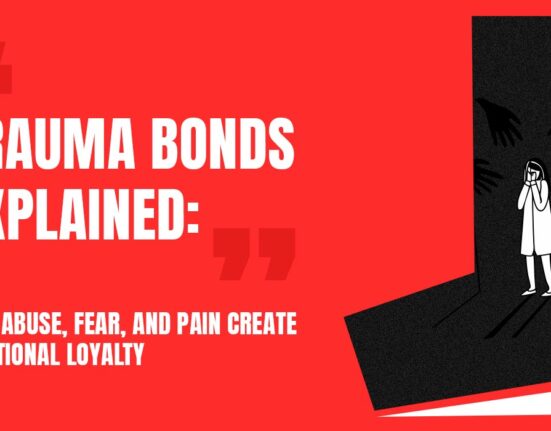Breakups are painful for everyone. Letting go of someone who once meant a lot to you is hard, irrespective of the nature of the relationship. Although it is necessary. During this turmoil, people want to seek relief. Some end up using the proper way of healing, whereas others may stray off the path. We live in a world where being “okay”, being productive, or bouncing back is glorified and rewarded.
Though that is the final goal we seek, it is necessary to properly heal from the pain caused by a breakup. In the hopes of getting “better”, people may avoid the complicated emotional outcome of a breakup, consciously or unconsciously. They tend to turn to distractions or rebound relationships to move on quickly. In doing so, they end up suppressing these messy emotions to seek the positive ones. Even though the positive emotions may offer short-term relief, they tend to be harmful in the long term. Hence, it becomes essential to heal and to heal properly to move on and move ahead.
Read More: The Psychology of Letting Go: 8 Attachments that hold us back
What is Emotional Bypassing?
Healing can be understood as the restoration of one’s sense of self, inner well-being, purpose, harmony, and balance. It involves a series of steps or stages; not distinct stages, but rather a continuous process. It becomes essential for people to move through all these stages, without missing any, to heal successfully. Healing allows people to move on and continue with their lives. Emotional bypassing is essentially skipping some part of healing or skipping it entirely. It is essentially avoiding the pain by distracting oneself or pushing one’s emotions down.
Emotional bypassing has been derived from the term spiritual bypassing. Emotional bypassing is the non-religious alternative to what people believe spiritual bypassing to be. Both mean to avoid the difficult personal issues and the emotions that arise from them, mainly the negative emotions and feelings (Welwood, 1984). Emotional bypassing is suppressing or resisting feelings that make us uncomfortable and cause us pain. These feelings are then replaced with positivity or joy, or simply ignored. This is obtained by keeping themselves preoccupied with other things. Emotional bypassing thus aims at avoiding discomfort and minimising emotional pain.
Stop Skipping Your Feelings
After a breakup, people tend to redirect their attention from uncomfortable emotions such as sadness, fear, anxiety, anger, etc., by pushing those emotions down or distracting themselves from experiencing them. Emotional bypassing can look different for different people. It could be distracting oneself with social media and Netflix, or numbing one’s emotions with substances like alcohol or drugs (Carson, 2024). But these uncomfortable emotions are a crucial part of being alive; they serve some purpose and make us human. They indicate that there is something we need to work on, something which will help us develop and grow. Understanding and overcoming such emotions helps prepare us for bigger challenges in life.
Essentially, emotional bypassing is an overemphasis on positive emotions and dismissing negative emotions, which in the end disrupts the balance or harmony. Hence, people need to be informed that no emotion is ‘unhealthy’ or ‘wrong’, and all of them serve some purpose or another.
Read More: Are Positive Emotions Just Fleeting Joy or Do They Have Lasting Benefits?
Why Do People Bypass Their Emotions?
The urge to distract oneself, suppress one’s emotions, and thereby bypass one’s emotions often stems from the fear of vulnerability. To avoid being further harmed, they suppress their feelings of hurt. Moreover, our society emphasises moving on quickly as an indicator of emotional strength, which is not at all the case. Though this societal emphasis may push people to numb their pain rather than sit with it and uncover it.
Bypassing emotions or suppressing them can cause an individual to dissociate from their internal emotional experiences, i.e., not recognise or be aware of what they themselves are feeling. This hinders other people’s understanding of an individual’s emotional states, thereby blunting any empathy or sympathy towards them and also making it difficult to form social bonds.
Suppressing emotions may also be wrongly interpreted as disinterest or “fakeness” by other people (Srivastava et al., 2009). Yet people tend to bypass their emotions in front of others to seem composed and well. Further, the discomfort of heartache caused after a breakup can seem vast and intolerable, causing people to instead seek instant relief through distractions. Instead of dealing with the difficult emotions, people would rather occupy themselves with other things like work, exercise, or even socialisation, which may appear to be productive, but often tends to delay emotional processing, not replace it.
People who bypass their emotions are hence just pretending to be fine and downplaying their emotions to themselves and others. This is to appear stoic and be admired by others rather than being critiqued or vulnerable to further harm. But this can eventually lead to people just being confused and distraught.
Read More: How to Stay Focused in a World Full of Distractions
Hidden Costs of Emotional Bypassing
1. Vicious Cycle
Bypassing emotions doesn’t actually make them go away. Rather, these emotions may add on to each other and grow in size, directly affecting one’s life in the end. This unresolved emotional baggage continues to go with you from one relationship to another, hence creating a vicious cycle of ‘red flags’ to say the least.
2. Delayed Grief
These suppressed emotions will eventually resurface, as they can be pushed down but not removed without actively resolving them. When this grief is delayed, it tends to be sudden and higher in intensity. People may have excessive reactions to small triggers. As a result, it may also show up in the form of depression, anxiety, emotional numbness, or a constant feeling of something being “off”.
3. Stunted Emotional Growth
Bypassing emotions robs you of the clarity, self-reflection, and emotional maturity that may arise as a result of sitting with difficult, uncomfortable emotions and working through them. Processing, understanding, and working on harmful emotions provides an opportunity for personal growth and self-discovery. It can help build resilience and empathy, eventually making an individual more emotionally mature.
4. Health Issues
Poor emotional regulation has been linked to both psychological and physical consequences. Later in life, suppressed emotional pain may manifest as psychological issues such as anxiety, depression, chronic stress, and other mental disorders. It may also lead to physical ailments such as heart disease, cardiovascular issues, indigestion, and greater inflammation etc. These issues may eventually seep into and affect an individual’s overall life, their work, relationships, personal life, and everyday functioning. These are just some of the most common and widely seen issues that may arise as a result of emotional bypassing (Carson, 2024; Richards & Gross, 1999).
Read More: Comprehensive Insights into Mental Health & Mental Disorders
Healthy Alternatives to Emotional Bypassing
The healthiest alternative to emotional bypassing is processing the emotions. Processing emotions allows one to understand and manage their emotions in a much healthier manner. It involves acknowledging the existence of painful emotions, labelling them, accepting that they exist and it is normal to experience them, and then learning from this daunting experience, which eventually leads to emotional growth.
Acknowledging emotions allows you to be okay with experiencing them, irrespective of whether these emotions may be positive or negative. It helps you to observe your emotions as an outsider, learn from where they arise, how, why, and what they mean. Labelling emotions improves your ability to understand them. Giving them a name can help reduce their intensity and make you gain control over them rather than them controlling you.
Then, accepting the negative emotions allows you to be okay with them and makes them less severe and dangerous. Also, accepting that this experience is common and that many people may feel the same way is helpful. Only after this can one work through them with the help of activities or hobbies that make you feel good, social support, and professional therapy, among many other ways (Gracia, 2024; Srivastava, 2013).
Conclusion
Emotional bypassing is an unhealthy way to deal with harmful or painful situations. It involves pushing these emotions down and/or distracting ourselves from these negative emotions. However, this is a maladaptive approach to healing. It can lead to many harmful consequences, like delaying grief, stunting emotional growth, creating a vicious cycle of suppressed, unresolved negative emotions, and also causing psychological and physical health issues. Thus, it is important to take a healthier alternative to it and deal with negative emotions rather than ignoring them.
Robert Frost, in his poem titled, ‘A Servant to Servants, written in 1915, says, “the best way out is always through”. In this poem, this means that the best way to overcome a problem is to confront it and pass all the way through it. The same is in emotional healing
after a breakup, or otherwise; i.e., the best way to resolve painful emotions or situations is to deal with them head-on, confront your situations and work your way through them, rather than around them or by skipping them. When you face a challenge head-on, you accept the painful reality and actually put in the hard work to endure it. Thus, eliminating pushing these emotions down to build up over time or completely ignoring them. This helps people persevere and become resilient.
FAQs
1. What is emotional bypassing?
Emotional bypassing is an unhealthy way to deal with harmful or painful situations. It involves suppressing or resisting feelings that make us uncomfortable and cause pain. These feelings are then replaced with positivity or joy, or simply ignored.
2. What are the costs of emotional bypassing?
Emotional bypassing can lead to many harmful consequences, such as a delayed feeling of grief, stunted emotional growth, development of a vicious cycle of unresolved negative emotions, and development of psychological and physical health issues like anxiety, depression, chronic stress, heart disease, cardiovascular issues, etc.
3. What is a healthier alternative to emotional bypassing?
A healthier alternative to emotional bypassing is processing the negative emotions and facing them head-on. It involves acknowledging the existence of painful emotions, labelling them, accepting their existence, understanding that experiencing them is common, and then learning from the negative situation they were in. Eventually leading to emotional growth.
References +
Anand, J., & Dalal, A. K. (in press). Concept, characteristics and process of psychological healing. In Indian Council of Philosophical Research, History of Science, Philosophy and Culture: Psychology and Psychoanalysis: Vol. 9. Indian Council of Philosophical Research.
https://ipi.org.in/texts/ajit/Concept%20of%20Psychological%20Healing.pdf Carson, J. (2024, May 5). What is Emotional Bypassing? How to Feel Your Feelings. The Now –. https://www.thenow.co/what-is-emotional-bypassing/
Frost, R., & Rodrigues, L. N. (2019). The Project Gutenberg EBook of Selected Poems, by Robert Frost. [EBook]. Henry Holt and Company. https://www.gutenberg.org/files/59824/59824-h/59824-h.htm#A_SERVANT_TO_SE RVANTS
Gracia, Z. (2024, December 16). Processing Emotions: Theory, techniques, and benefits. BetterMe Blog. https://betterme.world/articles/processing-emotions/
Richards, J. M., & Gross, J. J. (1999). Composure at any cost? The cognitive consequences of emotion suppression. Personality and Social Psychology Bulletin, 25(8), 1033–1044. https://doi.org/10.1177/01461672992511010
Srivastava, K. (2013). Emotional intelligence and organisational effectiveness. Industrial Psychiatry Journal, 22(2), 97–99. https://doi.org/10.4103/0972-6748.132912
Srivastava, S., Tamir, M., McGonigal, K. M., John, O. P., & Gross, J. J. (2009). The social costs of emotional suppression: A prospective study of the transition to college. Journal of Personality and Social Psychology, 96(4), 883–897. https://doi.org/10.1037/a0014755
Welwood, J. (1984). PRINCIPLES OF INNER WORK: PSYCHOLOGICAL AND SPIRITUAL. The Journal of Transpersonal Psychology, 16. https://www.atpweb.org/jtparchive/trps-16-84-01-063.pdf













Leave feedback about this